Urban Policy Dialogues 2021
Role of the Urban in Post-COVID Recovery
23 November 2021 | Virtual Convening

Urban Policy Dialogues 2021
23 November 2021 | Virtual Convening
The COVID-19 pandemic has wreaked havoc across India, deepening poverty, inequality, and structural vulnerabilities. This underscores the need to re-examine past development choices and strive for healthy, sustainable, and inclusive cities, urban areas, and rural communities. The 2021 Urban Policy Dialogues (UPD 2021) places the urban as central to new imaginations of post-pandemic futures and many reconfigurations of policy and practice to realize them. UPD 2021 is the 7th edition of IIHS’ Urban Policy Dialogues and is being held virtually.
UPD 2021 is anchored around the overarching question of ‘The Role of the Urban in Post-COVID Recovery’. It will do so by focusing on three themes: resilient infrastructure; inclusive water and sanitation; and land and housing. These thematic entry points will enable discussions on potential post-COVID recovery pathways, and where urban areas can contribute.
Participation is by invitation only.
India’s post COVID-19 economic recovery agenda should prioritize sustainable job creation, strong social safety nets, resilient infrastructure development, and green housing and buildings, and commit to addressing social, regional, and spatial inequalities. Cities and urban regions, given the concentrations of people and economic activity they represent, need to be the key site for such recovery processes and outcomes. A range of institutional and financing issues will need to be engaged with for unlocking the urban’s potential to heal and transform.
India will witness significant urban infrastructure investment in the coming years. This will be critical for economic growth, living condition improvements, and post COVID-19 recovery goals. Attention to resilience issues is necessary to ensure that these gains are not fragile and that investments deliver on other important goals of inclusive development, deep decarbonization, and transformative climate adaptation, and serve as a pivot for transitioning to a more resilient economy and society. Enabling resilient infrastructure will require improved understandings of risks, shocks, and stresses, the dense physical and process interconnections within city infrastructure systems, and the potential synergy between spatial planning, economic development, infrastructure financing, and urban governance.
The recently announced AMRUT 2.0 and SBM- Urban 2.0 offer an opportunity to sustain the investment and reform momentum that earlier incarnations of the two Missions have created. A familiar set of issues will need continuing attention: resource governance and management, service quality, pricing, and local government and community engagement. The urban poor face challenges of affordability, tenure, and voice in accessing quality services. Differences across states and town size classes require nuanced appreciation of resource and institutional contexts and adaptation of implementation approaches. Safety, dignity, and working conditions of workers engaged in the sector, particularly informal sanitation workers, has been a long-standing concern. Hence, achievement of sector goals, will be critically determined by inclusion and near-universal access.
Land and housing are important drivers for post-COVID recovery. Land management is critical to ensure that cities and regions best utilize their economic and development potential, by provisioning for sustainable use, development of resilient infrastructure, enabling revenue buoyancy for local bodies, and ensuring tenure security and housing for the poor. Housing investments present an opportunity for realizing secure, affordable, healthy, and dignified living conditions, especially for the poor and the most vulnerable. While updated and well-documented land rights have a role to play in this, there is a strong case for complementing affordable housing construction with housing upgradation and rental housing programmes and improved regulation of real estate activity.
| Time | Panel Description | Panelists |
| 9:30 am to 10:00 am | Introduction Launch of knowledge products
| Manish Dubey Chief – Practice, IIHSAromar Revi Director, IIHS |
| 10:15 am to 11:45 am | Session 1 Role of the Urban in Post- Covid Recovery | NK Singh Chairperson, XV Finance Commission Renana Jhabvala Chairperson, SEWASameer Sharma Chief Secretary, Govt of Andhra Pradesh |
| 12:15 pm to 1:45 pm | Session 2 Realizing Resilient Urban Infrastructure: Possibilities and Challenges | Kamal Kishore Member, National Disaster Management Authority (NDMA) Sumila Gulyani Program Leader, Infrastructure and Sustainable Development, World Bank IndiaShrinivas Kowligi Principal, UrbanXchange |
| 1:45 pm to 2:30 pm | Lunch | |
| 2:30 pm to 4:00 pm | Session 3 Water and Sanitation: Towards Inclusive Service Delivery | D. Thara Joint Secretary, Ministry of Housing and Urban AffairsShiv Das Meena Additional Chief Secretary, Govt of Tamil NaduSarada Muraleedharan Additional Chief Secretary, Local Self Government Department, Govt of KeralaV.K. Madhavan Chief Executive, Water Aid |
| 4:30 pm to 6:00 pm | Session 4 Land and Housing: Key Developments and Future Directions | Mathi Vathanan Principal Secretary, OdishaPravir Kumar Chairperson, UP Subordinate Services Selection Commission (UPSSSC) Gautam Chatterjee Former Chairperson, MahaRERA |
| 6:00 pm to 6:30 pm | Closing remarks | Aromar Revi Director, IIHS |
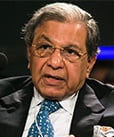 Shri N K Singh
Shri N K Singh
Chairperson of Fifteenth Finance Commission
Shri N. K. Singh is a prominent economist, academician, and policymaker. He is serving as the Chairperson of Fifteenth Finance Commission and is currently President of the Institute of Economic Growth. Prior to this, he was Chairperson of the Fiscal Responsibility and Budget Management Review Committee and served as a member of the Upper House of the Parliament, the Rajya Sabha, from 2008 to 2014.
Mr Singh had a long and distinguished career as a member of the Indian Administrative Service (IAS) before his entry into politics and fiscal policy leadership. He served as Expenditure Secretary, Revenue Secretary, and Secretary to the Prime Minister of India, among other senior leadership roles, and steered far-reaching tax reforms and infrastructure sector policies and projects during his stint in the IAS.
On the academic front, Mr Singh is a member of the Mentor Group and Governing Board of Nalanda University, co-chairperson of the India Advisory Board of the London School of Economics (LSE), Senior Research Fellow, Observer Research Foundation, and Trustee, Ananta Aspen Centre, India. He has been a recurring eminent guest lecturer at prestigious academic institutions and Universities like Columbia, Yale, Stanford, and the LSE has several notable books to his name and is a regular columnist in leading Indian newspapers.
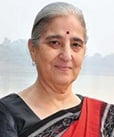
Ms Renana Jhabvala
Chairperson, SEWA Bharat and National Coordinator, SEWA
Ms Renana Jhabvala is the National Coordinator of the Self-Employed Women’s Association (SEWA) of India, Chairperson of SEWA Bharat, and co-founder and chair of WIEGO. She has a 35-year-long, distinguished career in organising working women in India into trade unions and cooperatives, engaging on policy issues, and writing about the informal economy. She has served as the Chancellor of Gandhigram Rural University, Tamil Nadu (2012–17), and was conferred the Padma Shri in 1990 for her contributions in the field of social work.
She has made a significant mark internationally as a member of the UN Secretary General’s High-level Panel on Women’s Economic Empowerment. In 2016, she was honoured with the FICCI Lifetime Achievement Award for her national and international contributions to social work. She has been a member of various committees of the erstwhile Planning Commission.
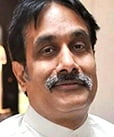 Dr Sameer Sharma
Dr Sameer Sharma
Chief Secretary, Government of Andhra Pradesh
Dr Sameer Sharma is an Indian Administrative Service officer of the 1985 batch and a scholar-administrator with over 37 years of experience in public and private governance. Presently Chief Secretary to the Government of Andhra Pradesh, he has in the past served as Special Chief Secretary, Planning and Resource Mobilisation, Government of Andhra Pradesh, Managing Director of the India Tourism Development Corporation, and Director of the Government of India’s AMRUT and Smart Cities Missions. In addition, he has chaired committees set up by the Ministry of Housing & Urban Affairs to design a national urban policy framework and the national policy on value capture finance and has been a consultant to UN-Habitat and the International Federation of Red Cross Societies. Dr Sharma has authored many books like Smart Cities Unbundled and Hourglass Management Paradigm.
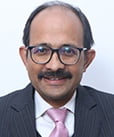
Shri Kamal Kishore
Member, National Disaster Management Agency (NDMA), India
Shri Kamal Kishore has worked on disaster risk reduction and recovery issues for over two decades at the local, national, regional, and global levels. He has been instrumental in establishing the Coalition for Disaster Resilient Infrastructure that was launched at the UN General Assembly in 2019. Before joining the NDMA, he worked with the United Nations Development Programme (UNDP) for about 13 years, in New Delhi, Geneva, and New York. At the UNDP headquarters, he led global advocacy campaigns to address disaster risk reduction concerns in the UN’s Sustainable Development Goals and the post-2015 development agenda.
Prior to UNDP, Shri Kishore served at the Asian Disaster Preparedness Centre as Director of Information and Research and Manager of the Extreme Climate Events Programme.
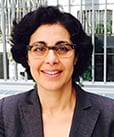
Dr Sumila Gulyani
Program Leader, Sustainable Development, World Bank India
Dr Sumila Gulyani is currently the World Bank’s Program Leader for Sustainable Development in India. In prior positions, she has served as the Bank’s Global Lead for Urban Development Strategy and Analytics, and Manager for Water and Urban Development in Europe and Central Asia. She has also lived in Kenya, where she worked on infrastructure and urban projects in six African countries. From 2005-2007, she taught at Columbia University in New York and served as the founding Director of its Infrastructure and Poverty Action Lab (I-PAL).
Dr Gulyani received her PhD in Economic Development and Urban Planning from the Massachusetts Institute of Technology and is the author of several articles and the book Innovating with Infrastructure.
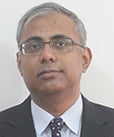
Shri Shrinivas Kowligi
Principal, urbanXchange
Shri Shrinivas Kowligi has over two decades of professional experience in urban sector advisory and project development across South Asia and South-East Asia. He has worked in leadership roles in institutions such as India Urban Space, PwC India, Ernst & Young (EY) and IBM, advising a number of cities and provincial governments on strategic visioning and spatial planning, infrastructure development planning, digital and non-digital interventions to enhance citizen experience, and market development for urban infrastructure and service delivery.
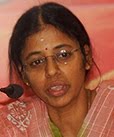
Thirumati D Thara
Joint Secretary, Ministry of Housing and Urban Affairs, Government of India
Thirumati D Thara is a 1995-batch Indian Administrative Service officer. Currently, Joint Secretary, Ministry of Housing & Urban Affairs, Government of India, she has previously served as the Vice-Chairperson and Managing Director of the Gujarat Industrial Development Corporation, Ahmedabad Municipal Commissioner, and Chief Executive Officer of the Ahmedabad Urban Development Authority (AUDA).
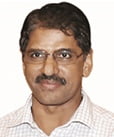
Thiru Shiv Das Meena,
Additional Chief Secretary, Municipal Administration and Water Supply Department, Government of Tamil Nadu
Thiru Shiv Das Meena is a 1989 batch Indian Administrative Service officer. He currently serves as Additional Chief Secretary, Municipal Administration and Water Supply Department, Government of Tamil Nadu. In the past, he has served as Additional Secretary in the Ministry of Housing and Urban Affairs, Government of India, Chairperson of the Central Pollution Control Board, and Chairperson and Managing Director of Housing and Urban Development Corporation Limited (HUDCO) and the NBCC (formerly, National Buildings Construction Corporation).

Smt Sarada Muraleedharan
Additional Chief Secretary, Local Self Government Department (LSGD), Government of Kerala
Smt Sarada Muraleedharan is a 1990 batch Indian Administrative Service Officer. Currently, Secretary, Local Self Government Department, Government of Kerala, she has in the past headed the Government of Kerala’s Kudumbashree Mission and served as the Chief Operating Officer of the National Rural Livelihoods Mission, Joint Secretary, Ministry of Panchayati Raj, Government of India, and Director-General, National Institute of Fashion Technology.
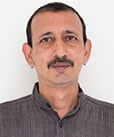
Shri V K Madhavan
Chief Executive, WaterAid India
Mr V K Madhavan has been Chief Executive, WaterAid India since 2016. A TED Global Fellow and a TED Senior Fellow, he was Managing Director of Skills Education Private Limited before joining WaterAid India. Mr Madhavan has worked on integrated development approaches in rural India during stints with the Central Himalayan Rural Action Group (CHIRAG) and the Urmul Rural Health Research and Development Trust, on policy issues with ActionAid as an independent consultant, and on women’s leadership and governance issues with The Hunger Project.
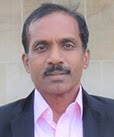
Shri G Mathi Vathanan
Principal Secretary, Department of Housing and Urban Development, Government of Odisha
Shri G. Mathi Vathanan is an Indian Administrative Service officer from the 1994 batch and is currently Principal Secretary, Department of Housing and Urban Development, Government of Odisha. He is leading the much-feted Jaga Mission, the world’s largest slum titling and upgradation programme, and pioneering inclusive models and trend-setting initiatives for delivery of water supply, sanitation, and waste management services, urban wage employment, and safety and dignity of sanitation workers.
Under his leadership, the Jaga Mission won the prestigious World Habitat Award 2019 and Puri became India’s first city to deliver 24X7 piped drinking water supply, an outcome benefiting the city’s 250,000 residents and 20 million tourists who visit the city annually.

Shri Pravir Kumar
Chairperson, UP Subordinate Services Selection Commission and ex-Chairperson, Uttar Pradesh (UP) Board of Revenue
A 1982 batch Indian Administrative Service officer, Shri Pravir Kumar retired as the Chairman of the Board of Revenue, Uttar Pradesh in July 2019 and is currently Chairman of UP Subordinate Services Selection Commission. He has earlier worked as Secretary to Government of India as well as Chief Secretary of Uttar Pradesh.

Shri Gautam Chatterjee
Founder Chairperson, Maharashtra Real Estate Regulatory Authority (MahaRERA)
Shri Gautam Chatterjee served as Founder Chairperson, Maharashtra Real Estate Regulatory Authority (MahaRERA) from 2017 to 2021. In a career spanning nearly four decades, he has served as Officer on Special Duty to the Chief Minister of Maharashtra, Housing Secretary, Government of Maharashtra, Chief Executive Officer, Maharashtra Housing and Area Development Authority, Joint Director General of Foreign Trade, Ministry of Commerce and Industry, Government of India, and Joint Secretary, Ministry of Defence, Government of India.



